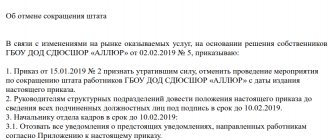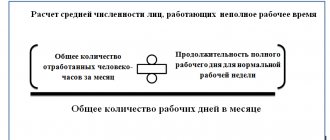Rate this article!
An interesting thing turns out... when undergoing a medical examination (preliminary or regular), you communicate with a doctor who evaluates your mental health. And then you find out that in addition to this medical examination, you need to undergo a psychiatric examination. Confusion? Perhaps it's reasonable. Therefore, today we are looking into who needs a psychiatric examination of workers (list of professions) and how to organize this examination. Let's get started!
By the way, immediately after passing a psychiatric examination, the employee will undergo a medical examination. Recently, the order according to which they are carried out has undergone interesting changes. Therefore, we included a story about them in a separate article: “Changes to Order 302N in 2021.” Go ahead, it's interesting!
Which employees undergo psychiatric evaluation?
Not all employees undergo psychiatric examination.
According to Art. 213 of the Labor Code of the Russian Federation, employees carrying out certain types of activities associated with sources of increased danger, as well as those working in conditions of increased danger, undergo mandatory psychiatric examination at least once every 5 years.
The entire list of hazardous factors and types of work can be found in Resolution 377 of April 28, 1993. These are workers who work at heights, catering workers, trade workers, warehouse workers, working with people (medics, educators, trainers, instructors), boiler room workers, machinists , machine operators, workers involved in high-voltage work, explosives, weapons, drivers of any vehicles, etc.
Financial side of the issue
Of course, the examination costs some money. By law, the financial obligations related to payment for this procedure are required to be covered by the employer.
Depending on which medical institution they chose, the cost varies from 1,500 to 15,000 rubles. Tariffs are approximately as follows:
- In dispensaries, municipal and city clinics - up to 2,000 rubles.
- In private clinics and commercial medical centers - from 3,000 rubles and above.
The employer pays for the procedure regardless of its result (i.e., whether the candidate passed it or not). This is done in two ways:
- According to the payment document presented by the applicant after inspection.
- According to the agreement concluded with the medical institution in advance.
If the employer does not pay for the inspection, then this should be taken as a violation of Articles 219, 213 and 212 of the Labor Code of the Russian Federation. A person can file a complaint with the labor inspectorate or even the court. For violation of the law, the employer will bear administrative liability, as stated in Article 5.27 of the Code of Administrative Offenses of the Russian Federation.
Although, of course, in the future the person may find himself without work. But working in an organization that breaks the law is an unattractive prospect.
What else do you need to know?
We have discussed what a psychiatric examination is and how it goes, here’s what else you need to know:
- A psychiatric examination is not just a certificate from a psychiatrist, but a special procedure directed by the employer.
- Psychiatric examination is carried out at the expense of the employer.
- Before being hired, an employee first undergoes a psychiatric examination, and only then (if clearance is obtained) undergoes a medical examination.
- By analogy with the procedure for conducting preliminary and periodic medical examinations, there is a division into work with harmful factors (chemical, aerosols, biological, etc.) and types of work with increased danger (driving transport, working with electrical installations, etc.) .
To what extent should employees be familiarized with the OPO procedure?
It is necessary to explain in advance to employees who will be examined that they must submit the following documents to the psychiatric examination commission:
- passport or other identity document;
- referral from the employer;
- a certificate from a psychoneurological institution at the place of permanent registration (a certificate from a drug dispensary is no longer needed);
- medical report of a previous psychiatric examination, if the employee has previously undergone one.
A psychiatric examination is carried out within 20 days from the date of the employee’s application to the medical commission. The period is extended if the commission needs additional information about the employee from other medical institutions.
After this, within 10 days, the commission makes a decision on the suitability or unsuitability of the employee for the work specified in the direction (clause 7 of the Rules, approved by Government Decree No. 695 of September 23, 2002).
After making a decision, the commission issues a written decision to the employee against signature within three days and informs the employer of the issue also in the form of an information message. This message must be processed by Human Resources. Whether or not to keep it in the employee’s personal file must be established in the employer’s local act.
Algorithm for conducting psychiatric examination of workers
1. We determine the contingent of workers who must undergo a psychiatric examination
For this purpose, we identify workers involved in work with harmful production factors. We analyze the type of work. Then we compile a list of positions and professions of employees subject to psychiatric examination, which fall under the list of Resolution 377.
To obtain information about harmful production factors, you can familiarize yourself with the results of a special labor assessment, where the information is recorded. If for any reason it is absent, it is necessary to conduct a thorough analysis of working conditions in the workplace and, if present (precisely presence, and not exceeding), note the identified factors in the direction.
For example , the staff of a grocery store includes: a director, an accountant, three salespeople, a loader and a driver.
Let's consider who should be referred for a psychiatric examination. Let's turn to Government Resolution 377 - it contains a conditional division into harmful factors and types of work.
Please note that special assessment cards for working conditions, unlike medical examinations, do not stipulate the need to undergo a psychiatric examination upon hiring and after. Therefore, this issue must be approached responsibly.
First, let's look at our positions for the presence of harmful factors.
- Chemical - none of the positions implies the presence of such factors
- Biological - none of the positions implies the presence of such factors
- Industrial aerosols - none of the positions involve such factors
- Physical – physical overload is possible for loaders. However, in order to make an accurate determination, it is necessary to conduct a special assessment of working conditions and familiarize yourself with the measurement protocol. If it has not been carried out and there is no data, you can try to analyze the work during the shift yourself. However, you can do it even simpler. In any controversial situation, it is better to do than not to do. The penalty for absence is always higher than the event itself. Based on this principle, the movers for a psychiatric examination regarding physical overload.
Next, let's look at our positions by type of work:
We draw attention to the paragraph “Employees of food industry enterprises, public catering and trade, dairy farms, dairy kitchens, distribution points, bases and warehouses of food products who have contact with food products during their production, storage and sale, including workers sanitary treatment and repair of inventory, equipment, as well as persons who have direct contact with food products during their transportation on all types of transport.” This category includes sellers who sell products, and drivers who transport them to the store.
There is also a category of work “Drivers of cars, motor vehicles and urban electric transport”. Accordingly, drivers .
Thus, we send loaders, sellers and drivers for a psychiatric examination . If a candidate for these positions has contraindications, the employer will not hire him and there will be no need to send him for a preliminary medical examination. If there are no restrictions, then these positions will go through this procedure again after 5 years.
So, as a result of the analysis, we received a list of positions and professions of workers for which it is necessary to conduct a psychiatric examination. What's next?
2. We draw up an order appointing a person responsible for conducting a psychiatric examination. As we have already written, in large companies the HR department sends new employees for a psychiatric examination, and then an occupational safety specialist takes over these functions. In a small company (grocery store), the director can assign these responsibilities to himself or to another responsible person.
3. Based on the received list of employees, we draw up an order for the company on the need to carry out this event for a number of positions. Employees must be familiarized with this order.
4. A list of employees by name and a calendar plan are drawn up , according to which they will be sent for a psychiatric examination. Employees also need to be familiarized with this calendar plan. In the case of the initial completion of this event, the deadlines are indicated in the direction itself.
5. We find a medical organization with which we enter into an agreement to provide this service. A medical organization must have a license, which must clearly state: “The organization has the right to provide services in the field of psychiatric examination .” A medical organization must have a medical commission, which is approved by the Ministry of Health! It is worth noting that there are often cases when these institutions are “monopolists”, which negatively affects the pricing policy and terms of the contract. Therefore, be prepared for the fact that the choice will be very limited.
6. We issue referrals to employees + submit a list of employees to the medical institution . The referral must indicate the employee’s position and harmful factors, the presence of which was the basis for referral to a medical institution. We make a note about the issuance of referrals in the medical examination register, or we create a separate register for recording psychiatric examinations. In the direction
7. The employee receives a conclusion from a medical commission on whether he has contraindications for work or not. If there are no contraindications, then the employer sends such employees for a medical examination
What questions are asked?
This is perhaps the main point that needs to be considered when talking about how a psychiatric examination is carried out.
But what questions the doctor asks cannot be said with one hundred percent certainty. It all depends on one case or another.
As a rule, standard questions come first, like:
- What day of the week and date is it today?
- What time of year and day is it?
- What city does the person live in?
- What kind of education did he receive?
- Who does he live with?
People who already have an impressive track record are asked few questions. They are limited to the standard “Do you have any complaints?” Psychiatrists are interested in having a worthy specialist work, as they say, in his place.
Of course, doctors can often set verbal “traps.” But they are not scary to a rationally thinking person. The most important thing is to answer confidently and calmly. If you are asked to take some special test containing questions on basic knowledge and logic, then you will need to use intelligence.
Sometimes questions like this are asked:
- Are you a performer?
- Were there any bosses or people in leadership positions in the family?
- What kind of child were you growing up? Were you calm or not, how often did you fight and conflict?
- Which country would you like to be born in if you had a choice?
- How did you earn your first money?
- Have you ever stolen?
- What films are you ready to watch every day?
- What was the last time you laughed?
- Do you have phobias?
Also, every person who wants to know how the psychiatric examination of employees is going should be aware that the doctor may ask to do something. For example, draw warmth, grief or safety. Or say which of these or other objects is superfluous (for example: an ax, a saw, a knife).
As a result, the totality of answers to tests and questions, the results of completed tasks, emotions manifested in the process and a host of other factors that the person himself may not pay attention to will paint a picture of his mental state for the specialist.
What to do if an employee refuses to undergo a psychiatric examination?
As we consider within the framework of the article, the procedure is a voluntary event. An employer does not have the right to “force” an employee to undergo a psychiatric examination. However, in the absence of a conclusion on this event, it has every right not to allow the employee to work. In case of employment, the future employee will actually “not get” into the staff of your organization.
If a current employee refuses to undergo a psychiatric examination, the employer, without the commission’s conclusion, has every right and must remove him from work until he receives this conclusion. In this case, wages and other payments from the employer are not retained by the employee.
In addition, refusal to undergo a psychiatric examination of an employee can be equated to a violation of labor discipline, which may be grounds for disciplinary action. According to the labor code, disciplinary action may in turn lead to dismissal. Thus, maintaining full-fledged labor mechanisms in the absence of results from the conclusion of the event in question is impossible.
Modern inspection methods
Continuing to study the topic of how and where one can undergo a psychiatric examination, it is necessary to pay attention to some features that have become increasingly common lately.
In the age of modern technology, it has become popular to take various tests, in particular for:
- Concentration.
- Adequate behavior in stressful situations.
- IQ.
- The ability to quickly make decisions in emergency situations and take responsibility for actions taken.
This especially applies to workers involved in law enforcement, military agencies, and security agencies.
A more thorough examination is also required when hiring specialists in the service sector. Everyone knows that working with a large flow of clients requires conflict-freeness and emotional stability. That is why the approach to inspection is so serious.
When discussing how the mandatory psychiatric examination of employees is carried out, it should also be noted that in some cases employers require a lie detector test. This is especially common in the banking industry and when hiring for positions that give the employee access to material assets.
Should a person undergo a psychiatric examination of this level without fail? No, he has the right to refuse. According to labor laws, management cannot insist if the candidate does not agree with the proposed conditions.










